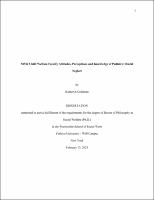Please use this identifier to cite or link to this item:
https://hdl.handle.net/20.500.12202/8702| Title: | MSW child welfare faculty attitudes, perceptions and knowledge of pediatric dental neglect |
| Authors: | Auerbach, Charles Pollack, Daniel Vyshedsky, Christine Discepolo, Keri Goldman, Katheryn |
| Keywords: | Social work child neglect child protection dental neglect graduate education |
| Issue Date: | 13-Feb-2023 |
| Publisher: | Yeshiva University |
| Citation: | Goldman, K. (2023). MSW child welfare faculty attitudes, perceptions and knowledge of pediatric dental neglect (Publication No. 30250635) [Doctoral dissertation, Yeshiva University]. ProQuest Dissertations & Theses Global |
| Series/Report no.: | Wurzweiler School of Social Work Dissertations;Publication No. 30250635 |
| Abstract: | The Master of Social Work curriculum provides foundational knowledge for the social work profession. Social workers are essential professionals in identifying and managing cases of child maltreatment as well as advocating for vulnerable populations such as children. Little is currently known about the extent to which dental neglect is incorporated into child welfare curricula in social work programs. This study aimed to examine the attitudes, perceptions and knowledge of educators teaching Master of Social Work child welfare courses toward pediatric dental neglect. The study employed a quantitative cross-sectional descriptive design with four open-ended questions. The data was gathered using a purposive sampling method via a perception-based survey sent to 306 United States-based programs. The quantitative data were analyzed in STATA using hierarchical linear modeling and descriptive statistics. The qualitative data were analyzed whereby meanings formulated through participant responses were manually clustered into themes. When controlling for experience as a child welfare supervisor, gender, years of educating in child welfare, and frequency of dental neglect in the child welfare curriculum, the odds of investigation response for medical neglect and dental neglect decreased significantly by 98% compared to physical abuse. The random effects parameters of the identification and seriousness models demonstrated the least agreement between participant scores of physical abuse and dental neglect when compared to the other forms of child maltreatment. Dental neglect also had the lowest mean scores of identification and seriousness and the highest standard deviations in scoring. A variability in rationale of the action taken for dental neglect was also noted in the qualitative data. While all participants generally noted the child maltreatment vignettes as serious and as constituting child maltreatment, dental neglect was seen as significantly less serious and less distinctly a form of child maltreatment. |
| Description: | Doctoral dissertation, PhD / Open Access |
| URI: | https://hdl.handle.net/20.500.12202/8702 https://ezproxy.yu.edu/login?url=https://www.proquest.com/dissertations-theses/msw-child-welfare-faculty-attitudes-perceptions/docview/2784394031/se-2?accountid=15178 |
| ISBN: | 9798374410655 |
| Appears in Collections: | Wurzweiler School of Social Work: Dissertations |
Files in This Item:
| File | Description | Size | Format | |
|---|---|---|---|---|
| Katheryn Goldman MSW Child Welfare 13Feb2023 OA.pdf | 568.23 kB | Adobe PDF |  View/Open |
This item is licensed under a Creative Commons License

